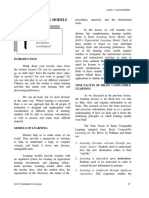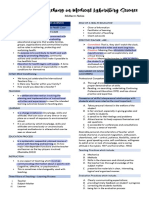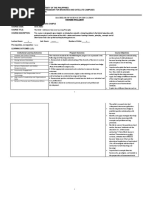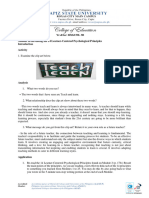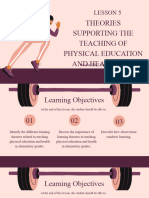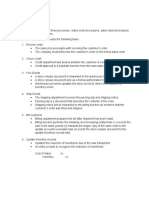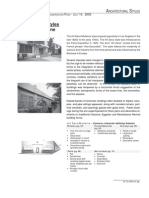0 ratings0% found this document useful (0 votes)
6 viewsSelection of Teaching Strategies
Selection of Teaching Strategies
Uploaded by
Lil ConicCopyright:
© All Rights Reserved
Available Formats
Download as PDF, TXT or read online from Scribd
Selection of Teaching Strategies
Selection of Teaching Strategies
Uploaded by
Lil Conic0 ratings0% found this document useful (0 votes)
6 views5 pagesCopyright
© © All Rights Reserved
Available Formats
PDF, TXT or read online from Scribd
Share this document
Did you find this document useful?
Is this content inappropriate?
Copyright:
© All Rights Reserved
Available Formats
Download as PDF, TXT or read online from Scribd
Download as pdf or txt
0 ratings0% found this document useful (0 votes)
6 views5 pagesSelection of Teaching Strategies
Selection of Teaching Strategies
Uploaded by
Lil ConicCopyright:
© All Rights Reserved
Available Formats
Download as PDF, TXT or read online from Scribd
Download as pdf or txt
You are on page 1of 5
ACA 327 – Principles and Methods of Teaching Accounting
Donell Christian A. Cloma
SME: Mr. Gonzalo D. Ruales, Jr., CPA, MBA
GUIDING PRINCIPLES IN THE
SELECTION AND USE OF TEACHING
STRATEGIES:
1. Learning is an active process.
• We have to actively engage
the learners in learning
activities if we want them to
learn what we intend to
teach.
• Hands-on-minds learning
• Research shows 3. A non-threatening atmosphere
o 75% retention rates enhances learning.
in learning by doing • Physical classroom
o 90% retention rates condition:
learning by teaching o Proper lightning
others. o Good ventilation
o Order
o Tidiness
o painting of the room.
• Psychological climate:
o personality of a
teacher
o rapport between
students and the
teacher
o relationship among
students
2. The more senses that are involved
Steps on how to create a positive
in learning, the more and the
classroom atmosphere:
better the learning
1. Cultivate culture respect
2. Believe in our student’s capacity.
ACA 327 – Principles and Methods of Teaching Accounting
Donell Christian A. Cloma
SME: Mr. Gonzalo D. Ruales, Jr., CPA, MBA
3. Make our students feel they evaluation to hone our
belong to a community of learners student’s thinking skills.
with shared goal or purpose 7. An integrated teaching approach
4. Encourage more collaboration is far more effective than teaching
and cooperation and less isolated bits of information.
competition • considers the Multiple
5. Give allowance for mistakes Intelligences (MI) & varied
GUIDING PRINCIPLES IN THE learning styles (LS) of
SELECTION AND USE OF TEACHING students
STRATEGIES:
4. Emotion has the power to
increase retention and learning.
• bring emotion into the
classroom
• recognize the power of
emotion to increase
retention.
5. Learning is meaningful when it is
connected to the student’s
everyday life.
• The meaningfulness &
relevance of what we teach is
An integrated approach
considerably reduced by our
incorporates successful,
practice of teaching simply for
research- based and brain-
testing.
based instructional strategies.
• “answering pedagogy”
6. Good teaching goes beyond recall
Some research findings about
of information
the brain (Wolfe, 2001):
• teaching should reach the
1. Without rehearsal or
levels of application,
constant attention,
analysis, synthesis, and
ACA 327 – Principles and Methods of Teaching Accounting
Donell Christian A. Cloma
SME: Mr. Gonzalo D. Ruales, Jr., CPA, MBA
information remains in 1. Involving Students in Real-life or
working memory for only Authentic Problem-Solving
about 15-20 secs. 2. Using Projects to Increase
2. Learning is a process of Meaning & Motivation
building neural networks. 3. Simulations & Roleplays as
Meaning makers
4. Classroom Strategies Using
Visual Processing.
Visuals are powerful aids in retention as
well as in understanding.
3. Our brains have difficulty
comprehending very large
numbers because we have
nothing in our experience
to ‘hook’ them to.
4. The eyes contain nearly
70% of the body’s sensory
receptors & send millions of
signals every second along
the optic nerves to the
visual processing of the
brain.
5. There is little doubt when
information is embedded in
the music or rhyme, its
recall is easier than when it
is in prose.
BRAIN – BASED STRATEGIES:
ACA 327 – Principles and Methods of Teaching Accounting
Donell Christian A. Cloma
SME: Mr. Gonzalo D. Ruales, Jr., CPA, MBA
ACA 327 – Principles and Methods of Teaching Accounting
Donell Christian A. Cloma
SME: Mr. Gonzalo D. Ruales, Jr., CPA, MBA
5. Songs, jingles & raps -END-
6. Mnemonic Strategies
7. Writing Strategies
8. Active Review
9. Hands-on activities
An integrated approach is also
interdisciplinary and multidisciplinary.
Touch the other aspect of life outside the
school.
An instructional Approach is also
integrated when it includes the
acquisition of knowledge, skills as well as
values. Relate your subject with other
subjects.
GUIDING PRINCIPLES IN THE
SELECTION AND USE OF TEACHING
STRATEGIES:
8. There is no such thing as best
teaching method. The best
method is the one that works, the
one that yields results.
Factors to consider in the choice of
teaching method:
a. Instructional objective
b. Nature of the subject
matter;
c. The learners;
d. The teacher; &
e. School policies.
You might also like
- Episode 7 FS 2 Guiding Principles in The Selection and Use of Teaching MethodsDocument10 pagesEpisode 7 FS 2 Guiding Principles in The Selection and Use of Teaching MethodsChin Fu Paloma60% (5)
- Cognitivist Learning Theory and Its Implications On Classroom Teaching and LearningDocument6 pagesCognitivist Learning Theory and Its Implications On Classroom Teaching and LearningArcherOnWeed75% (4)
- How Good Are Your Leadership Skills - QuestionnaireDocument3 pagesHow Good Are Your Leadership Skills - QuestionnaireParasuraman Krishnamoorthi100% (2)
- Lesson PlanDocument10 pagesLesson PlanALCAYDE AMADO III P.100% (1)
- Citizenship EducationDocument9 pagesCitizenship Educationisankurnia100% (2)
- Guiding Principles in The Selection Use of AS9Document14 pagesGuiding Principles in The Selection Use of AS9Mariane SibayNo ratings yet
- Selection and Use of Teaching StrategiesDocument3 pagesSelection and Use of Teaching StrategiesJhulie San NicolasNo ratings yet
- Guiding Principles in Selection and Use of Teaching StrategiesDocument14 pagesGuiding Principles in Selection and Use of Teaching StrategiesLou PerezNo ratings yet
- NCM102j MODULE 4Document4 pagesNCM102j MODULE 4Jenny Ruth TubanNo ratings yet
- Learning Theories Group 2 Chapter 5Document41 pagesLearning Theories Group 2 Chapter 5Alondra L. FormenteraNo ratings yet
- Rotc Learning Models PDFDocument5 pagesRotc Learning Models PDFFheby Indriyanti NurpratiwiNo ratings yet
- Guiding Principles in The Selection and Use of Teaching StrategiesDocument6 pagesGuiding Principles in The Selection and Use of Teaching StrategiesZarah Joyce SegoviaNo ratings yet
- Guiding Principles in The Selection and Use of Teaching StrategiesDocument14 pagesGuiding Principles in The Selection and Use of Teaching StrategiesLou PerezNo ratings yet
- SLP3Document4 pagesSLP3Clyde PeñanuevaNo ratings yet
- ED105 ReviewerDocument10 pagesED105 Revieweraizabhelle2003No ratings yet
- Aim To Top Principles and Strategies of TeachingDocument13 pagesAim To Top Principles and Strategies of TeachingMOHAMMAD DATUGANNo ratings yet
- Template - MC SSE 112 Module 8Document2 pagesTemplate - MC SSE 112 Module 8Zenabi IbañezNo ratings yet
- Educp PrelimsDocument8 pagesEducp PrelimsLuchie AnatalioNo ratings yet
- Teaching As A Process or As A Giving Off ProcessDocument47 pagesTeaching As A Process or As A Giving Off ProcessLoucil UrsulaNo ratings yet
- Lesson 1 Educational Psychology A Tool For Effective TeachingDocument8 pagesLesson 1 Educational Psychology A Tool For Effective TeachingJay Mark CabreraNo ratings yet
- Aim To Top Principles and Strategies of TeachingDocument12 pagesAim To Top Principles and Strategies of TeachingMOHAMMAD DATUGANNo ratings yet
- Health Education-LESSON 3 PERSPECTIVES ON TEACHING AND EARNINGDocument5 pagesHealth Education-LESSON 3 PERSPECTIVES ON TEACHING AND EARNINGAlthea DapasenNo ratings yet
- Module 4Document19 pagesModule 4jacqui Lei BarrettoNo ratings yet
- Lesson 6 Principles and Strategies in Teaching MathematicsDocument5 pagesLesson 6 Principles and Strategies in Teaching MathematicsJeorge HugnoNo ratings yet
- Psthe MidtermDocument6 pagesPsthe MidtermTrisha GolesNo ratings yet
- Integrative ReviewerDocument6 pagesIntegrative ReviewerMontecer, Donnalyn S. BSE SOCIAL STUDIES 2ENo ratings yet
- Unit - Ii:: The Principles of LearningDocument3 pagesUnit - Ii:: The Principles of LearningAlly PongNo ratings yet
- The Child - Adolescent Learners Learning Principles SyllabusDocument8 pagesThe Child - Adolescent Learners Learning Principles SyllabusAllen Beato100% (6)
- (Template) Prof Ed 7 - Ch1Lesson 1Document7 pages(Template) Prof Ed 7 - Ch1Lesson 1jennymacion20No ratings yet
- LP-6 UtsDocument11 pagesLP-6 UtsVLADIMIR SALAZARNo ratings yet
- 5 Types of Learning Learning Styles2 TransesDocument7 pages5 Types of Learning Learning Styles2 TransesDanica DaniotNo ratings yet
- Teaching StrategiesDocument68 pagesTeaching StrategiesEugene SaldivarNo ratings yet
- Teacher Self-Assessment Tools: Kjohnson60@hamline - EduDocument6 pagesTeacher Self-Assessment Tools: Kjohnson60@hamline - EduFLOR PASCUANo ratings yet
- Strategies in Health Teaching Chapter 1Document4 pagesStrategies in Health Teaching Chapter 1Sophia Elinor MenesesNo ratings yet
- FS2 - Learning Episode 7 Guiding Principles in The Selection and Use of Teaching MethodsDocument10 pagesFS2 - Learning Episode 7 Guiding Principles in The Selection and Use of Teaching Methodssheilajanedlasala100% (1)
- Principles of Good Teaching PracticeDocument33 pagesPrinciples of Good Teaching Practiceacey keyleyNo ratings yet
- Uself FinalsDocument7 pagesUself Finalsbackupedpd05No ratings yet
- Answer 1Document3 pagesAnswer 1Dancing DivaNo ratings yet
- Health Education MidtermsDocument8 pagesHealth Education Midtermsyshie manlapazNo ratings yet
- Unit II PDFDocument27 pagesUnit II PDFKitty BaluNo ratings yet
- Prof - Ed 109 Chapter1 (Millano, Jocelyn, O. Bse II Science)Document4 pagesProf - Ed 109 Chapter1 (Millano, Jocelyn, O. Bse II Science)Celyn MillanoNo ratings yet
- Lyva ActDocument6 pagesLyva Actletlyvalenzuela03No ratings yet
- Module - Gonzales - Facilitating Learning - 2Document4 pagesModule - Gonzales - Facilitating Learning - 2ariannerose gonzalesNo ratings yet
- TIP - Module 5 - The Learning ProcessDocument6 pagesTIP - Module 5 - The Learning ProcessSarah Mae PerezNo ratings yet
- Sec Rtii Tier1Document4 pagesSec Rtii Tier1api-446537912No ratings yet
- Week 1Document42 pagesWeek 1julianna102404No ratings yet
- Jamaica PEDocument30 pagesJamaica PEMyca HernandezNo ratings yet
- Actelec3 MidtermDocument19 pagesActelec3 Midtermlor ًNo ratings yet
- Lesson 4.2 Implementing A Curr... Daily in The ClassroomDocument18 pagesLesson 4.2 Implementing A Curr... Daily in The ClassroomJenny AsanNo ratings yet
- Week 6 - Unit 5.1: Learning Processes: Curriculum and Course Design - PER 3260Document22 pagesWeek 6 - Unit 5.1: Learning Processes: Curriculum and Course Design - PER 3260Alexandra Bachero BeltránNo ratings yet
- Nota KuliyahDocument15 pagesNota KuliyahHameezNo ratings yet
- Principles of Teaching: Submitted By: Arnold V. Viñas Submitted To: Mrs. SolomonDocument13 pagesPrinciples of Teaching: Submitted By: Arnold V. Viñas Submitted To: Mrs. SolomonArnold VinasNo ratings yet
- Problem Centered Design: V. Crafting The CurriculumDocument9 pagesProblem Centered Design: V. Crafting The CurriculumKarole Niña MandapNo ratings yet
- Health Education Process NOTESDocument4 pagesHealth Education Process NOTESAriane NobleNo ratings yet
- Prof Ed 321 PDFDocument9 pagesProf Ed 321 PDFPELAEZ, JOANNA MAY L.No ratings yet
- Learning and Teaching Important Questions by Being A Best TeacherDocument43 pagesLearning and Teaching Important Questions by Being A Best Teacherlalit kumarNo ratings yet
- Approach, Methods & Techniques: Jon Vennie IbaleDocument22 pagesApproach, Methods & Techniques: Jon Vennie IbaleJON VENNIE IBALENo ratings yet
- Introduction To Psychology of Learning - Lecture NotesDocument12 pagesIntroduction To Psychology of Learning - Lecture NotesJulie ClarizaNo ratings yet
- Lesson 3 (Enrichment Activities)Document5 pagesLesson 3 (Enrichment Activities)Jaafar SorianoNo ratings yet
- Reflection in Medical Education MCQsDocument10 pagesReflection in Medical Education MCQsdeangimsrNo ratings yet
- Structuring Learning Environments in Teacher Education to Elicit Dispositions as Habits of Mind: Strategies and Approaches Used and Lessons LearnedFrom EverandStructuring Learning Environments in Teacher Education to Elicit Dispositions as Habits of Mind: Strategies and Approaches Used and Lessons LearnedNo ratings yet
- The Adult Learners Handbook: Step-By-Step to Deliberate Practice, Active Recall And a Growth MindsetFrom EverandThe Adult Learners Handbook: Step-By-Step to Deliberate Practice, Active Recall And a Growth MindsetNo ratings yet
- Revenue Cycle Conceptual SystemDocument7 pagesRevenue Cycle Conceptual SystemLil ConicNo ratings yet
- Expenditure Cycle: PayrollDocument4 pagesExpenditure Cycle: PayrollLil ConicNo ratings yet
- Conversion CycleDocument3 pagesConversion CycleLil ConicNo ratings yet
- Topic 1 in RE 112Document70 pagesTopic 1 in RE 112Lil ConicNo ratings yet
- EXPENDITURE-CYCLE InventoriesDocument6 pagesEXPENDITURE-CYCLE InventoriesLil ConicNo ratings yet
- The Early Life of JesusDocument72 pagesThe Early Life of JesusLil ConicNo ratings yet
- III. FILIPINO IDENTITY AND MORAL STANDARDS-b. Filipino ValuesDocument6 pagesIII. FILIPINO IDENTITY AND MORAL STANDARDS-b. Filipino ValuesLil ConicNo ratings yet
- Antimicrobial AgentsDocument20 pagesAntimicrobial AgentsLil ConicNo ratings yet
- Kochs Postulates For The 21st CenturyDocument1 pageKochs Postulates For The 21st CenturyLil ConicNo ratings yet
- Kore - Sore - Are - With ActivityDocument19 pagesKore - Sore - Are - With ActivityLil ConicNo ratings yet
- Ed286 Practice Lesson 1Document7 pagesEd286 Practice Lesson 1api-528786466No ratings yet
- RADTECH XRAY - 072017 Legazpi PDFDocument3 pagesRADTECH XRAY - 072017 Legazpi PDFPhilBoardResultsNo ratings yet
- Bright and Sunny English Lesson Education PresentationDocument18 pagesBright and Sunny English Lesson Education PresentationFei YeeNo ratings yet
- Art Deco - FeaturesDocument2 pagesArt Deco - FeaturesLong JoeNo ratings yet
- Teens 3 - Final Oral TestDocument4 pagesTeens 3 - Final Oral Testnascimentocardosoartur79No ratings yet
- Handloom in Odisha: An Overview: Shruti Sudha MishraDocument15 pagesHandloom in Odisha: An Overview: Shruti Sudha Mishraniku007No ratings yet
- Strategies For Pet and Fce Exams Con VideoDocument7 pagesStrategies For Pet and Fce Exams Con VideoCONSTANSA BARCONo ratings yet
- Salas Lesson 1Document3 pagesSalas Lesson 1api-364340713No ratings yet
- AnswerDocument4 pagesAnswerBelle Herminigildo Angeles100% (1)
- ICMR - Reproducible AI in Medicine and HealthDocument9 pagesICMR - Reproducible AI in Medicine and Healthvignesh16vlsiNo ratings yet
- 7 Grade Grading PolicyDocument2 pages7 Grade Grading Policyapi-413794743No ratings yet
- Questions For ML - Built A ThonDocument7 pagesQuestions For ML - Built A ThonAmandeepNo ratings yet
- Lampiran 4-8 - Hasil Olah DataDocument11 pagesLampiran 4-8 - Hasil Olah DataIstriPratiwiNo ratings yet
- Pega PRPC Pega Rules Process Commander - HKRDocument8 pagesPega PRPC Pega Rules Process Commander - HKRsridhar varmaNo ratings yet
- 0.2 - Quantitative Methods Syllabus For CSS (Lia Tsuladze)Document8 pages0.2 - Quantitative Methods Syllabus For CSS (Lia Tsuladze)Nabila Ayu KhairaniNo ratings yet
- Structure of Operating SystemsDocument56 pagesStructure of Operating SystemsOmosa Elijah MochamaNo ratings yet
- Ged0114 Sa1Document3 pagesGed0114 Sa1Anne Marieline BuenaventuraNo ratings yet
- Unit PlanDocument28 pagesUnit Planapi-249701677No ratings yet
- Thesis ProposalDocument34 pagesThesis ProposalDeva Persikmania ManchunianNo ratings yet
- Reading and Literacy - Week7 Sept 16 19Document15 pagesReading and Literacy - Week7 Sept 16 19Nymph DevóughNo ratings yet
- Namillangan National High SchoolDocument5 pagesNamillangan National High SchoolRico EdureseNo ratings yet
- Pas Bahasa Inggris Kelas 8 Paket 1Document11 pagesPas Bahasa Inggris Kelas 8 Paket 1Vulkan AbriyantoNo ratings yet
- Full Make AI Robots Create Amazing Robots With Artificial Intelligence Using Micro Bit 1st Edition Reade Richard Ebook All ChaptersDocument62 pagesFull Make AI Robots Create Amazing Robots With Artificial Intelligence Using Micro Bit 1st Edition Reade Richard Ebook All Chapterslaotvambo100% (3)
- Form 14Document4 pagesForm 14WinstonEnriquezFernandezNo ratings yet
- 2016 Specimen Paper 3 PDFDocument20 pages2016 Specimen Paper 3 PDFn_baissNo ratings yet
- REBT Education KnausDocument146 pagesREBT Education KnausmarineanuNo ratings yet
- Vygotsky and The Classroom PDFDocument13 pagesVygotsky and The Classroom PDFKhusairi Anwar100% (1)
- 1916 PDFDocument244 pages1916 PDFAvijit PorelNo ratings yet










